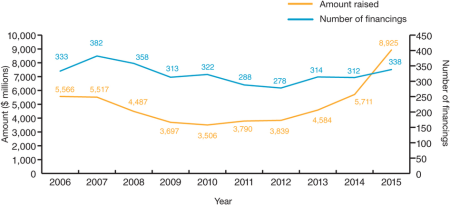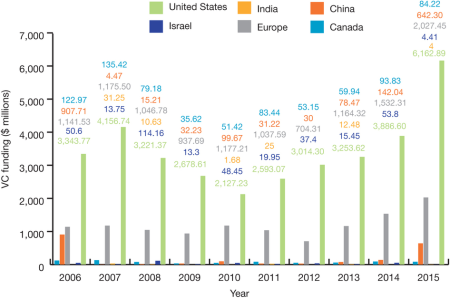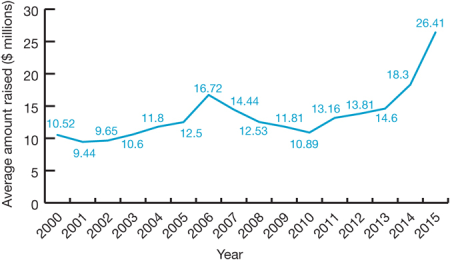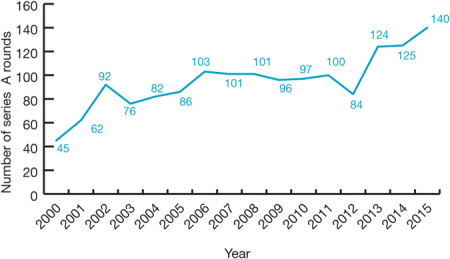
Despite an understandable amount of gloom and doom in patenting circles regarding the effects of the recent Supreme Court and Federal Circuit jurisprudence on life sciences patents (Mayo v. Prometheus; AMP v. Myriad Genetics; Ariosa v. Sequenom as leading examples), investors appear to remain optimistic regarding the potential for successful commercialization in the sector. According to a June report in Nature Biotechnology there are several reasons to be positive, as shown in the graphs accompanying the article (see Huggett, "Biotech's wellspring—a survey of the health of the private sector in 2015," Nature Biotechnology 34: 608–15 (2016)).
Over the past ten years (with the evident decline during the Great Recession of 2008) the amount raised and number of VC fund financing of biotech companies as improved, particularly with regard to the amount invested in this sector (up 60% since 2005 and 155% from the lowest amount invested in 2010):
Global amount and number of financings raised by VC funds, 2006-2015

See Huggett (2016), Figure 1.
The U.S. showed the most robust investment in biotech drugs since 2006, followed by Europe and China, although Chinese investment has been more uneven than investment in the West:
VC investment for drug development biotechs by region

See Huggett (2016), Figure 2.
Average global investment has more than doubled since 2000, and has increased by almost 150% since 2010:
Global average amount invested per VC round

See Huggett (2016), Figure 3.
And this trend is even more dramatic in the number of "A" rounds of investment during this timeframe:
Number of A rounds, 2000–2015

See Huggett (2016), Figure 4.
Whether this trend continues may depend on whether the deleterious effects of these court decisions begin to become apparent. For example, Sequenom began the year by laying off about a quarter of its staff, mostly in its Carolina facility that had been processing its fetal diagnostic maternal blood tests, and by midyear had been acquired by LabCorp. If investors react to these occurrences, and should small biotech diagnostics companies continue to meet either resistance to further patenting from the USPTO or invalidation of existing patents in the courts, the improvements reported by Nature Biotechnology may reverse. Perhaps such an eventuality, as painful as it may be and harmful to the global economic and physical health, it might promote new thinking regarding the wisdom of the Supreme Court's foray into subject matter eligibility.